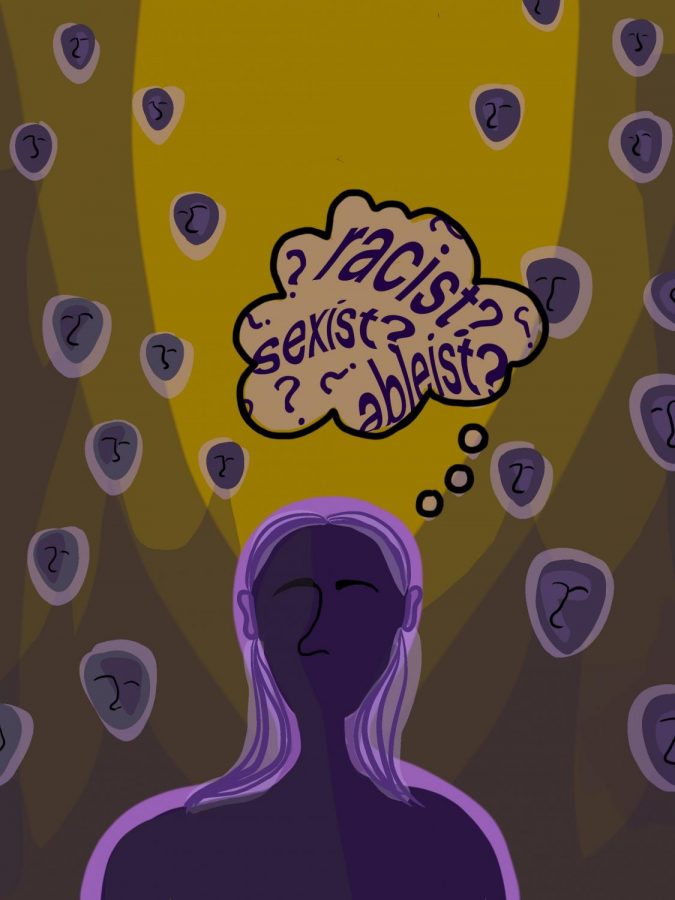Kulture a la Kaavya: Prejudice is inescapable. Also, it sucks.
We are all racist, sexist, homophobic, ableist, etc. There is not one person on Earth that is free of prejudice.
Okay, I have to get something off my chest: I’m racist. I’m also sexist, homophobic, ableist and classist. Wow, that feels good. Now, here’s the thing. If you were shocked by me saying that, you shouldn’t be. We are all racist, sexist, homophobic, ableis and all the other -ists. There is not one person on Earth who is free of prejudice.
Well, you might tell me, “No, Kaavya! I’m not sexist! I’m a woman!” or something similar and sure, you’re right on some level. But as we grow up, we are exposed to ridiculous amounts of discrimination, making us discriminatory, even in our own heads.
For example, a study showed that Americans were likely to associate Black (as in race) with “violence,” and women with “weakness.” This is known as semantic co-occurrence: when two things are presented near each other quite often, we begin to associate them together.
Let’s take sexism, for example. No matter how much of a feminist you may be, there’s some part of you that was once taught that women are inferior to men. It’s in movies, TV shows, politics, literature and pretty much anything you can think of. It’s in movies as old as “Sabrina” and as new as “The Kissing Booth,” from John Steinbeck to Stephen King. We, as humans, are being spoon-fed discrimination and it is pretty much impossible to not be part of it.
These thoughts become ingrained in our heads over time. Regardless of how much we may fight against it, these issues go so deep, they’re hard to recognize sometimes. No one is immune. I’m not going to sit here and say that I haven’t been a part of this. I’ve recently begun to notice that I slut-shame other women in my head, am more wary around POC than I am of white people and so much more. I’ve been working to stop myself from having these thoughts and I’ve been semi-successful but it is pretty hard, considering how normalized it is.
So what’s the effect of these thoughts? Well, as you can expect, our thoughts have an effect on our actions, especially in microaggressions: “everyday slights, indignities, put downs and insults… in day-to-day interactions.” Examples include “You’re so articulate for a Black person” and store clerks following BIPOC (Black and Indigneous People of Color) people around stores. The issue is that people often don’t even realize that they’ve engaged in a microaggression because we don’t question it. We don’t even realize that we are bigoted because we think that we’re “one of the good ones,” as if believing in equality makes us impervious to unconscious bias.
It’s about keeping ourselves in check. Make sure your first impressions are based on valid information, not split-second discrimination. Thinking that a person might have seeing issues if they wear glasses is based on information but thinking a person of color is somehow dangerous is not. And yes, that’s not a switch you can instantaneously make, it will take effort and time. We need to be cognisant of our initial impressions and actively question them because often, the reasons are built upon lies and prejudice. Taking care to respect people, especially in how you perceive them, is critical.
But you and I don’t deserve a pat on the back for this. If we treat not being prejudiced as some sort of gold standard, we encourage complacency and diminish the chances of real change that actually helps people. I’ve seen it happen before, where we glorify men for not sexually harassing women, as if it’s some kind of achievement or we prize shows for having a gay character, never mind if that character is heavily stereotyped.
Here’s the thing, though: I don’t think we can ever be free of prejudice, no matter how hard we work. However, there is a line to be drawn between unconscious and conscious prejudice. Maybe your split-second impressions are discriminatory, but you have to correct yourself. You have to make the decision to be better. And that doesn’t just apply to what you think. Educate yourself on social issues you may not understand to truly realize why you can have an impact. Use whatever position and privilege you may have to actually do good.
I am fully aware I need to work on using my privilege. I can’t tell you about how I’ve been hurt by these unconscious biases because I have not. Yes, I’m a woman of color but I’ve been pretty lucky, all things considered, given that I’m South Asian in a relatively Asian-friendly area. Yes, I’ve faced a little bit of stupid racism about tiny things and yes, I’ve seen debate judges criticize me more than my male counterparts but for the most part, I’ve been fine.
To be frank, I’m a preachy, somewhat hypocritical sixteen year old telling you to use your voice when this is the first time I’m publicly taking a strong stance on these things. When I started writing “Kulture à la Kaavya,” I wanted to talk about social issues like this, things that I care about. I am aware that my position on Talon gives me a louder voice and a wider audience than most at that school. And maybe you might not write for a school newspaper but there are always ways to help. I want to do more, I’m just not quite sure what I will do. We may not be able to change what we are fed, we may not be able to change the world, but we can always do better.





